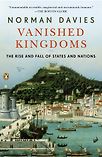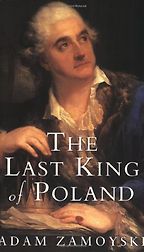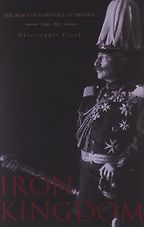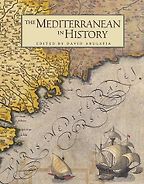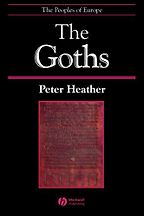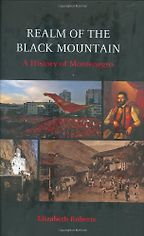Will you begin by telling us about your book, Vanished Kingdoms: The Rise and Fall of States and Nations, and what these “vanished kingdoms” are?
The topic is Europe’s extinct states. Not just kingdoms but empires, republics – polities of any sort which have ceased to exist. Which is a normal phenomenon. States always collapse and disappear, sometimes very quickly, sometimes after centuries or millennia, but they have a finite term in any part of the world. It’s just a given of human institutions. Sooner or later they fall apart and are replaced by something else. The key quotation is from Jean-Jacques Rousseau. He says, “The body politic, like the body of a man, begins to die as soon as it is born. It contains the seeds of its own destruction.” Brilliant. Absolutely spot on.
People who have their eye on short-term, contemporary events and the world around us tend to forget this. I sometimes think they imagine the world politic to be a chessboard, where you play games, have a crisis, and then you put all the pieces back and have another game. Well it’s not like that. You can have a chessboard, you have players who are either pawns or kings or whatever, but the players themselves are always changing.
In the last 20 years, four or five European states have vanished, depending on how you deal with Yugoslavia. The German Democratic Republic was merged into Germany. The Soviet Union – the biggest state in the world, with the biggest nuclear arsenal – went up in smoke. Czechoslovakia dissolved by mutual consent – the two parties decided to have a velvet divorce. And then the Federation of Yugoslavia exploded in slow motion – bits flew off and continued to fly off until there was nothing left, apart from Serbia.
“In the last 20 years, four or five European states have vanished.”
My book traces the phenomenon from fifth century Visigoths in Aquitaine to the Soviet Union. I didn’t go back to the Roman Empire, although it is obviously one of them. So there’s a big spread of time. I deliberately chose case studies from each end of Europe – north, south, west, centre – including smaller examples which tend to get left behind in general narratives.
Why do they get left behind? Why are they forgotten?
This is a crucial question. You’ve heard the saying that “history is written by the victors”. It is very true. My very first chapter is about the Visigoths in Gaul, an even bigger kingdom than the Franks. It looked, objectively, at the beginning of the sixth century, that the Visigoths would be the dominant power in post-Roman Gaul. But there was a battle, and Clovis the Frank killed Alaric the Visigoth. And the history of post-Roman Gaul has been written by post-Roman Franks, and most recently by the French, who identify with the Franks. Nobody identifies with the Visigoths. Clovis has a great mausoleum in Saint Denis, and nobody even knows where the tomb of Alaric the Visigoth may be. Apart from all sorts of legends and echoes which surface, of the Dan Brown variety, there’s very little to show for a century of the Visigoths being the very first barbarian kingdom in the Western Roman Empire.
If these kingdoms are swept under the rug of history, what can we learn by going back and remembering them, researching their history as you do?
The main thing is that mainstream history – the subjects which we concentrate on in schools, in television programmes and influential books – is driven by a number of factors, one of which is power politics. The powers of today wish to trace their rise and the origins of their influence. But also, historians are drawn to power. China, which was neglected for ages, becomes a major player on the world stage, and everybody now wants to learn about the history of China. When I was a student at Oxford – a long time ago – there was no course on Chinese history. It didn’t exist. And it’s not just powerful states, it’s powerful issues. It might be feminism or slavery – things which were missing but are now contemporary issues. They drive a lot of history writing.
Are you disparaging this tendency? Because that seems to suggest that if a polity has vanished it has less merit for the present day.
Well, I complain about the American style that nothing succeeds like success. That’s a very primitive way of looking at history, as between winners and losers. Sure, there are crackpot rickety states, but who’s interested in them? What they are really interested in is the successful cultures, the big civilisations, the mighty powers and so on. That gives a very false view of the panorama of the past. The past is full of everything. Great powers, obscure powers – which may have other achievements to their name. There are powers which last for centuries, but I found a republic which lasted for one day.
Goodness me. Which day?
March 15, 1939. The republic of Subcarpathian Ruthenia. It was the day that Hitler marched into Prague. The Germans swallowed Bohemia and Moravia, formed a protectorate and Slovakia became a client statelet of the Reich. And the third part of Czechoslovakia, this Subcarpathian Ruthenia, was left with nobody to tell it what to do. So it declared its independence at around 10 o’clock in the morning. And by the evening the Hungarian army arrived and swallowed it up. Fortunately there was a British travel writer – or someone posing as such – there at the time who described all this.
What do we learn from the losers, to simplify my original question?
Well, what do we mean by the losers? Even the mightiest of states eventually decline and die, like human beings. There are some states which are powerful, mighty and impressive for a time. Prussia was, of course, one of the biggest beasts. Or Poland-Lithuania is a key example – it was the biggest state in Europe for a period. And then it develops internal diseases and is swallowed up by its neighbours. The kingdom of Poland was certainly a loser by the end, but you can’t define it as a loser state.
So we should think of it in terms of ebb and flow, not winner and loser?
Precisely. Rise and fall. These are biographies, life stories, of states. There’s always a birth, a struggle for existence. Some candidates fall by the wayside before they really establish themselves, some flourish, some go on for millennia. But they all come to an end.
The classic book on all this, which isn’t on my list, is Edward Gibbon’s Decline and Fall of the Roman Empire. This was the guidebook, if you like, to long-term history – that there are these enormously powerful, extensive empires which exude an air of immortality and yet which all, sooner or later, come to an end. At the end of the Roman Empire, in the Byzantine period, the empire shrinks and shrinks until it consists of one city, Constantinople, and the Ottoman Turks can encircle it. There’s a final siege and the Turks go over the wall. The last emperor – number 156 or whatever – disappears in the fray, is killed, and that’s the end of the empire. This is, if you like, the guidebook to this story, to exactly what Rousseau is saying. No matter how powerful they may look, the time will come, as in the lives of men and women, when they die. It’s not a topic that people are eagerly looking at.
So let’s look at it deeper. Your first book is The Last King of Poland.
Well, I mentioned the Commonwealth of Lithuania and Poland. And because I have written about Poland so often, I decided in my new book to write about just one half of it, the Grand Duchy of Lithuania, whose origins were separate from Poland and which, in the period before it joined with Poland, stretched all the way from the Black Sea, where Odessa now is, to the Baltic. This is in the 14th and 15th centuries. The Grand Dukes of Lithuania by marriage take over the kingdom of Poland. And because they’re kings, the story is usually told from the Polish angle. All the history books talk about the partitions of Poland in the 18th century. Well, it was the partition of the Commonwealth of Poland and Lithuania. And the monarchs – until it became elective – were Lithuanians who took over Poland. Jogaila became the King of Poland but he was a Lithuanian. I’m sure he couldn’t speak a word of Polish when he started. Vytautus the Great, who was his cousin, staged a great Lithuanian campaign to resist the merger with Poland, but it’s a long story and goes on until the end of the 18th century.
The Last King of Poland, Adam Zamoyski’s biography of Stanislaw-August Poniatowski, is the book I would recommend for people to get a feel for it. Everyone says he was King of Poland, but he came from Lithuania. He was born on a big estate in what is now Belarus. He was one of Catherine the Great’s many lovers, and he was raised to the throne through his many connections in Russia. The book is extremely well done, very well written. It shows the terrible dilemma he faced. He was a client of the Russian Empire who realised that his political masters, the Russians, wanted him to keep his country as a poor, unsuccessful, poorly educated, poorly organised shambles, because then they could exploit it. He was a big figure of the Enlightenment and a great educator. He attempted to reconstruct all the elements of a successful state in the teeth of opposition from his political masters and neighbours, namely the Russians.
What traces of Lithuanian identity remain in that part of the world today?
All the chapters in my book have three sections. One is a thumbnail portrait of somewhere in the present. In the case of the Grand Duchy of Lithuania, it’s Lukashenko’s Belarus. Not many people know that Belarus was at the heart of the Grand Duchy of Lithuania.
Tim Snyder wrote a wonderful book, which could easily be on this list, called The Reconstruction of Nations. It’s about how from the population of the Grand Duchy of Lithuania, destroyed in 1795, there arose several modern nations: the Lithuanian national movement, based on the Lithuanian language; the Belarussian national movement; and, interestingly, the Polish national movement. [Józef] Pilsudski, Marshal of Poland and one of the biggest figures of Polish history in the 20th century, said he wasn’t a Pole. He came from Vilna – that is, Lithuania.
Is Lukashenko a Lithuanian too, then?
No, Lukashenko is not Lithuanian in the modern sense. He is, of course, a dictator, and he is trying to cobble together a view of Belarussian history which is separate from that of Russia. Their big danger is, of course, that they will be swallowed up by their dear friends across the border. So he’s doing very strange things with history, one of which is to emphasise that Belarus is the true heir of the Grand Duchy of Lithuania, not Lithuania next door. Lithuania, of course, is appalled. They think the Grand Duchy was theirs, but Lukashenko’s people are saying no, it’s ours.
That’s very interesting. So these vanished kingdoms are being used by present-day states to affirm their identity in the face of possible assimilation. Do you think that Belarus will exist in 50 years?
I think it will. It’s an absolutely appalling story which I only touch on in the book, but Stalin killed virtually all the educated Belarussians. It was a small peasant country which had for 200 years been told that Belarussians are actually Russians, that their language was just a dialect of Russian, and that educated people spoke Russian. They were forcibly converted – by which I mean their priests were killed – to Russian orthodoxy. And then Stalin comes along. The first generation in the 1920s was allowed to learn the Belarussian language in school. There’s a brief generation of people – teachers, activists, professors – who promote Belarussian identity for the first time. Stalin shoots the lot of them.
What’s next on your list?
The next one is Prussia, which is another huge topic. Prussia is not one of the forgotten countries. It’s one of the kingdoms which was so powerful in its final phase, in the late 18th century to 1918, that memory of Hohenzollern Prussia, Bismarck and the creation of the German Empire is so recent and powerful that the memory of the earlier Prussia has all but been obliterated.
The book I recommend, Chris Clark’s Iron Kingdom, a history of Prussia, is an extremely good book about modern Prussia. But it doesn’t give any indication of the many things that came before it. Namely, that the original Prussians were not Germans – they were Balts like the Lithuanians. The medieval history of Prussia that brings them into recorded history is when the German Teutonic knights lead a crusade to Christianise Prussia. And they are so successful that they eradicate the local people, the local language and culture. It did survive long enough to be recorded.
The Teutonic state is 1224 until 1525. Then in come the Poles. The last Grand Master of the Teutonic knights, Albert, accepts Lutheranism. He’s been the Grand Master of a Catholic crusading order, and he sets himself up as secular Duke of Prussia and recognises the King of Poland as his suzerain. You’ve got quite a long period of Prussia and Poland being closely involved. Albert, of the House of Hohenzollern, the great German hero – his mother was Polish! And because he had rejected Catholicism (the Hohenzollern relatives in Brandenburg and Berlin were Catholics at the time) he was a black sheep, and he was much closer to his Polish relatives than he was to his German relatives. But all this is, as it were, forgotten history.
Was there a catalyst to the fall of the Prussian state, or was it an inevitable decline? Why is there no Prussia today?
Well, the rise of Hohenzollern Prussia comes about through the decline of all its neighbours. Until that point, Prussia was not a premiership player – it was the Swedes or the Poles or the Holy Roman Empire. These were the big powers of the area. They all declined, and Prussia rose up. Then Prussia gets caught up in German history, and the kingdom of Prussia comes to an end in 1918, when the Kaiser – who was also King of Prussia – abdicated. But most of these stories have an afterlife. There is a state of Prussia which continues within the Weimar Republic and even in the Third Reich. Goering was prime minister of Prussia. People don’t know that because they don’t think of it that way. It’s only when you have a different entry point to history that you get all these different connections. Prussia was still alive in 1945. The last pre-Nazi prime minister of Prussia appeared in 1945 saying we Prussians are the victims of the Nazis, a bit like Austria, and Prussia must be restored by the Allied powers. But there was no way Stalin was going to allow the restoration of Prussia, and in 1947 the Allied powers arrived with their certificates and Prussia no longer existed.
Let’s move on to your third selection.
The third one is Aragon, and again is a very long story. The Iberian peninsula, for a long period, was dominated by three powers – Castile, Portugal and Aragon. Together, these Christian states drove out the Islamic, Moorish elements. Reconquista starts in the 11th century and goes on until the end of the 15th. Of these three, the winner in terms of power politics is Castile. Castile gets hold of the Americas. Although Ferdinand of Aragon and Isabelle of Castile, the Catholic monarchs, join together, the two kingdoms remain separate within Spain. The Castilians insist that no Aragonese will go to America, and that none of the gold of America will go to Aragon, it all goes to Castile. Gradually the Aragonese part of the Spanish complex declines, and its empire in the Mediterranean is taken over – Sicily, Naples, Corsica. The Aragonese even ruled Athens and Crete, in the late 14th century.
So why did they decline?
Well, it’s relative decline. The book that I’m going to recommend, The Mediterranean in History, isn’t directly about Aragon, but the author, David Abulafia, has written a great deal about Aragon. He used to be my pupil. The book is not just about Aragon, but Aragon is a big chunk of it – and it was a big chunk of the Western Mediterranean for 500 years. The Aragonese monarchy fell to the house of Trastámara in 1369 and the monarchy becomes Castilian. Gradually the Aragonese interests are neglected, and Castile centralises and takes over Aragon by a series of risings. It’s a bit like Poland and Russia – the big power taking over, with constant risings against the greater power which keep getting crushed.
Which book is up next?
The book I recommend is The Goths by a man called Peter Heather. It’s a general survey of all the different Goths. There is a chapter about the Visigoths in Aquitaine called “The First Successor State” – to the Roman Empire in the west, that is.
What went wrong for the Visigoths?
This was a straightforward example of defeat by a military power – by the Franks, another barbarian nation which had invaded Gaul. There was a great battle near Poitiers, at a little place called Vouillé. The Visigoths were defeated and they retired from Aquitaine over the Pyrenees. They took over Spain, and there were nearly three centuries of the Visigoths in Spain. One of the curious things is that the only monument to Alaric, the Visigoth king killed by Clovis the Frank, is in Madrid. These twisted, contorted memories is one of the themes I deal with in my own book.
Whether by military defeat or political decline, if a state vanishes that doesn’t necessarily mean that its identity vanishes with it. The people and culture remain, surely?
That’s a good question. When the Visigoths were defeated, how many stayed behind to serve the Franks? The identity of a state is very fluid, and a lot depends on the fate of the people – what happens to the people when one country is conquered by another. Anglo-Saxon England is a perfect example. Before the Anglo-Saxons came there was no England. They came into Roman Britannia and they took over the lands of Britain. They slaughtered and drove out British leaders. The story is that the British retreated and made the Western peninsula their home – what we now call Wales. And it now seems that the Welsh founded Glasgow.
I’ve heard about this. What is this story?
You see, the whole of our island used to be Celtic, British. There were no Anglo-Saxons until they came over the sea. The Scots came from Ireland and gradually took over the north of the island, which we now call Scotland. Scotland was formed in the ninth century. The Anglo-Saxons came over from the east and they created England.
Five Books interviews are expensive to produce. If you're enjoying this interview, please support us by donating a small amount.
But before Scotland or England existed, there were a number of false Roman native kingdoms of which the culture and civilisation was Celtic, or what the English called Welsh – which is a very nasty word, meaning alien. The Germanic peoples, who couldn’t talk with these Celts, called them Welsh – aliens. And the indigenous population of the region where Glasgow is – Strathclyde, as it’s called now – was Welsh. The chief hero of medieval Scotland was William Wallace. Wallace means Welsh. The Scots don’t tell you that. They had this theory that William Wallace’s family came from Shropshire, which is how they try to explain how a Welshman could be in what they thought of as Scotland. They didn’t know that these Welsh of the north were not intruders from Wales, they were there long before the Scots.
What’s last on your list?
The last one is Montenegro. The book is Realm of the Black Mountain by Elizabeth Roberts. Elizabeth Roberts was at Oxford, and was the wife of the master of Trinity College. I think he was the British ambassador in Belgrade, and when she was there she became interested in Montenegro and wrote this book. It was the first book that I read about the history of Montenegro. What I concentrate on in my own book is a short period, 1910 to 1918, when Montenegro was a kingdom. Montenegro was an Allied state in World War I and the only Allied state which wasn’t restored afterwards. It was swallowed up, by very devious means, by the Serbs – who were one of our other allies. It’s a bit like Poland after World War II. That is, one of our allies, the Poles, would be swallowed up by a bigger and more powerful ally, namely the Soviet Union. And we, the British and the Western Allies, who can’t do anything about it, tend not to notice. So it’s a bit of a pointer to the inequities or hypocrisies of Allied policy. Throughout World War I, one of the war aims was the restoration of occupied Allied countries like Belgium and Montenegro.
What’s the afterlife of historical Montenegro in modern-day Montenegro?
Well, the chapter goes on. Montenegro is swallowed by Serbia, and then of course Serbia becomes part of Yugoslavia, until 1992 when the Federation of Yugoslavia is reduced to Serbia and Montenegro, the last two parts that hold together. Then the Montenegrins begin to feel increasingly uncomfortable with Milosevic and Serbia, they split, and Montenegro is recognised as a sovereign state member of the United Nations in 2006. As soon as that happens, the ex-communist leader of Montenegro puts up a statue – to whom? The last king of Montenegro. So they begin to cultivate Montenegro’s independent history.
So again it’s using history as a prop to establish their modern identity. But what is actually lost when an old polity vanishes, if its people and cultural legacy often remain?
It’s all to do with identity, and identity has many roots. Language is one of them. The Montenegrins speak Serbian. In fact, they call themselves Serbs. So in Serbia the Montenegrins are just part of us. We weren’t taking over another country, they say, we were welcoming other Serbs back into the fold. The parallel is Austria. Are Austrians German? Well, they speak German. But they have very different traditions, and they don’t think of themselves as German. Hitler behaved like the Serbs, saying, “I am the chancellor of Germany and I’m Austrian. Of course we will take over Austria and we will be welcomed by the populace, because the Austrians, as everybody knows, are Germans like the rest.” Well they’re not. They have a different history. And the Montenegrins have a different religious history. The Montenegrin orthodox church had broken away from the Serbian orthodox church.
To what extent do former USSR countries share an identity with the old Soviet Union? Is it misleading to think of them as such?
Some of them do. In Belarus or parts of Ukraine there are still statues of Lenin. But this Soviet connection is cultivated by people who see the Soviet Union as not being Russian, but as being a multinational empire which is trying to develop a different Soviet identity – Homo Sovieticus – in which smaller nations like Belarus or Ukraine could be on an equal footing with the Russians. The same is true of Yugoslavia. The Yugoslav identity was cultivated by Croats who wanted to get away, as it were, from their own nationalists and create a new Yugoslav community in which Croats, Serbs, Bosnians and Macedonians could all live together in peace and harmony.
But neither experiment worked. Why?
Big question, small answer. The answer is force, violence. In Belarus, Stalin goes in and he shoots virtually the entire intelligentsia of this little country. Tito in Yugoslavia was extremely brutal and murderous against people who didn’t agree with him – Croat nationalists or whoever.
I’ve just been to the Cheltenham [literary] festival, and one of the questions was: Is Putin trying to revive the Soviet Union? Part of the afterlife of the Soviet Union is, of course, in Putin’s brain. Putin is ex-KGB, an organisation founded to preserve the Soviet state which failed completely. Putin must have a terrible sense of failure. In fact, he has said that the collapse of the Soviet Union was the greatest catastrophe of modern times. So sure, Putin, in the back of his mind, would like to reassemble if not the Soviet Union, then some sort of empire, a broader Russian-dominated grouping which would be a modern version of the Soviet Union. I don’t think he’s got a cat’s chance in hell.
My final question – a counterpoint of sorts – is about the European experiment today. Europe has been at war with itself for millennia. Now we have the EU. Do you think that the EU will put an end to this history of conflict, that there will be no more redrawn borders?
It’s an absolutely key question. I think that a crisis such as we see developing now makes it absolutely essential for Europe to refocus itself, to weigh up what its aims and perspectives are. The changes that happened in 1989 and afterwards were unprepared for. Nobody saw it coming, the collapse of the Soviet bloc and all these countries dying to join the union. Enlargement took place without any real change of governance. Systems which were designed to rule six countries of similar economic and political development simply don’t work with 27.
Get the weekly Five Books newsletter
Enlargement took place, and the eurozone was created without any due recognition of basic facts. Basically, no enforcement. You set up a common currency, and you lay down rules that you’re not allowed to increase your debt to more than whatever it was. The first country to break them was Germany. Then the French broke it. And then along come the Greeks, who say, “Ah, well if the big boys can get away with it, who’s going to control us?” It’s got completely out of hand, because the eurozone was set up without enforceable rules, without the political mechanisms for governing this currency area. I think it’s obvious now that they either have to transform the eurozone quickly and make it workable – give it rules which can be observed and for which there are penalties – or it really is going to fall apart.
And behind that is the European Union. Is there a European identity strong enough to overcome the national identities of its member states? It’s touch and go. But I’m an optimist. I think there will be one hell of a crisis. I doubt if the EU will disappear, but it will be severely chastened. And it will have to put its house in order. Otherwise it will become one of the vanished kingdoms. It wouldn’t be unprecedented for that to happen.
This interview was published on October 27th, 2011
Five Books aims to keep its book recommendations and interviews up to date. If you are the interviewee and would like to update your choice of books (or even just what you say about them) please email us at editor@fivebooks.com

